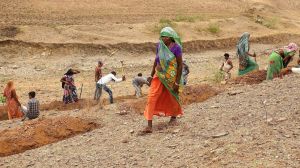Five states 8211; Uttar Pradesh, Bihar, Orissa, Maharashtra and West Bengal 8211; that make up almost 60 per cent of India8217;s below poverty line BPL population managed to corner less than a fifth of the total jobs created under the UPA8217;s flagship National Rural Employment Guarantee scheme during the first six months of 2007-2008. In the previous year, they accounted for a third of the total jobs created.
Their failure to utilise the one-of-its-kind scheme effectively could be because of multiple reasons: inadequate information, low wage rates and poor staff to implement the programme, according to an assessment by Montek Singh Ahluwalia, Deputy Chairman, Planning Commission for the Prime Minister. The assessment of state-level performance is based on a simple premise. For example, if a state has 20 per cent of the country8217;s poor, it should account for around 20 per cent of the employment created under the NREG scheme.
Ironically, another set of five relatively well-off states 8211; Madhya Pradesh, Assam, Rajasthan, Chattisgarh and Andhra Pradesh 8211; had a good show. These states, though accounting for just a fifth of the BPL population, generated more than 60 per cent of the total jobs during April-December 2007.
In a recent note to the PM, Ahluwalia admitted there could be some fudging of muster rolls and leakages given the scale and size of the scheme. But, the UPA government8217;s record in job creation in Rural India was massively better than the previous National Democratic Alliance government, he said. The NREG scheme helped generate 143.5 crore man-days in 2007-08, about 68 per cent more than in 2003-04, the last year of the NDA tenure.
The most important aspect in the longer run, however, was the need to ensure that the works undertaken enhance land productivity, he said. 8220;We are far from achieving it,8221; Ahluwalia said in his letter, adding that at present, the works chosen were simply an arbitrary collection of local projects put together by the local administration.

































